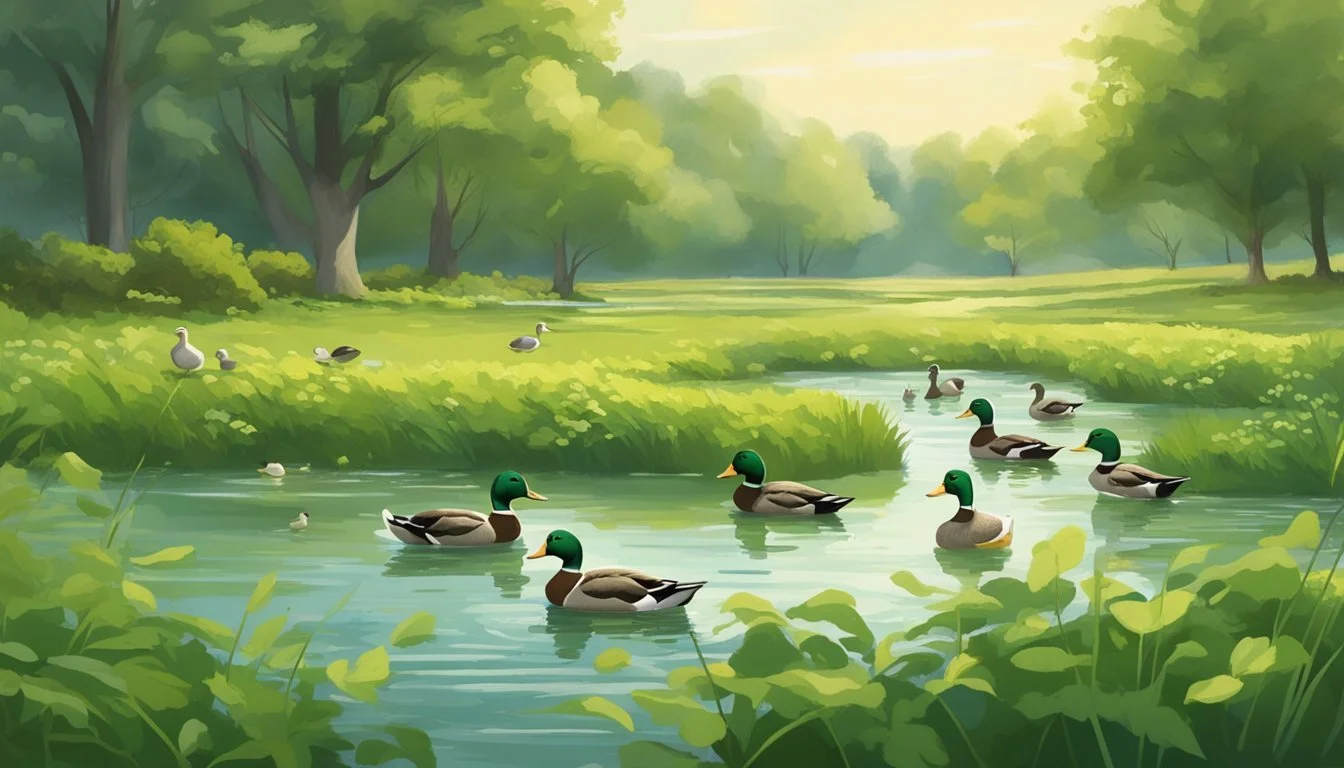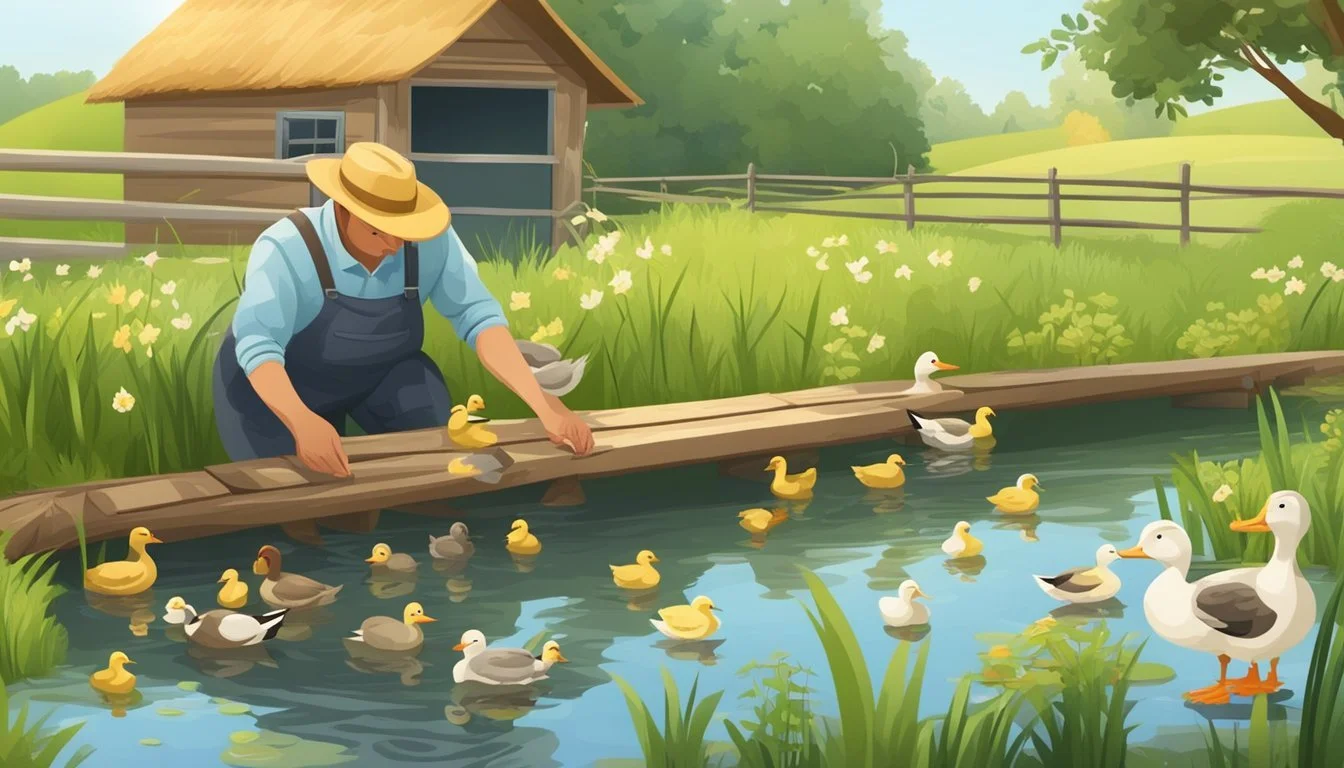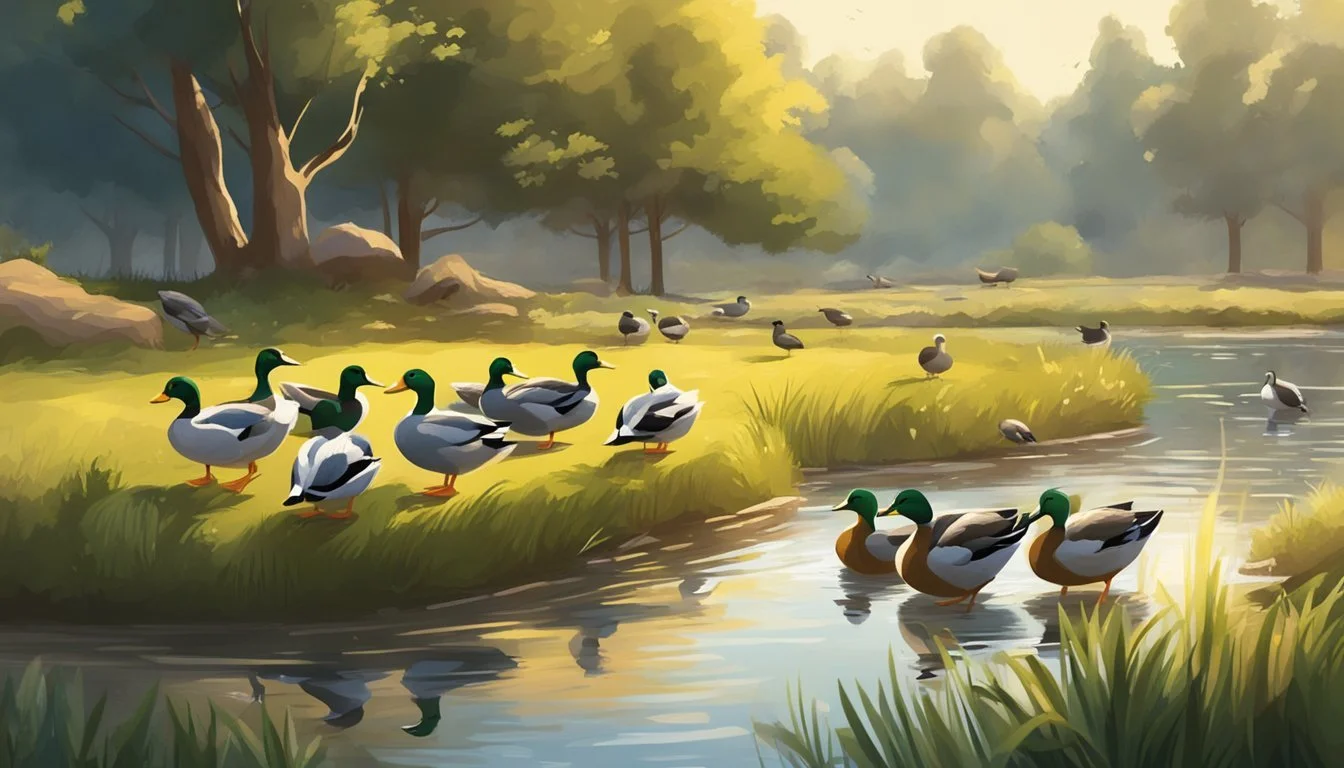The Benefits of Duck Farming on the Homestead
Sustainable Living and Profitability
Duck (What wine goes well with duck?) farming presents a unique opportunity for those living on a homestead to diversify their agricultural activities and enhance self-sufficiency. These waterfowl are not only hardy and adaptable but they also offer a wealth of benefits that extend beyond their obvious contribution of eggs and meat. They lay more eggs than chickens, ensuring a plentiful supply, and their eggs are larger and richer in flavor, providing a gourmet alternative for culinary enthusiasts.
Integrating ducks into a homestead's ecosystem also contributes to the health and productivity of the land. Their foraging habits naturally reduce the presence of pests, and their droppings serve as an excellent source of fertilizer, enriching the soil without the need for chemical inputs. Furthermore, ducks are social creatures that can easily integrate with other poultry, making them an agreeable addition to a diverse farmyard.
In terms of maintenance, ducks are generally easier to care for than other poultry, as they are more resilient to many common bird diseases and parasites. This resilience translates to fewer veterinary costs and reduced need for interventions, which is particularly beneficial for homesteaders aiming for organic or natural farming practices. Duck farming also offers a peaceful ambiance, as ducks tend to be quieter than chickens, making them ideal for homesteaders who prefer a serene environment.
Advantages of Raising Ducks
Raising ducks on a homestead presents multiple benefits, ranging from the nutritional value of their products to their contributions towards sustainability. They are not only a source of food but also serve as helpful partners in garden maintenance and pest control.
Rich Nutritional Profile of Duck Products
Duck eggs provide a substantial nutritional advantage with a richer flavor compared to standard chicken eggs. They contain higher amounts of omega-3 fatty acids, protein, and vitamins such as B12, contributing to a healthier diet. Similarly, duck meat is known for its taste and high iron content, making it a valuable food source for individuals focusing on diverse and iron-rich diets.
Natural Pest Control and Garden Benefits
Ducks excel in pest control, as they forage for insects, snails, and slugs, effectively reducing the need for chemical pesticides in the garden. Their fondness for pests allows them to act as natural protectors for plants, minimizing damage and promoting a healthier garden ecosystem.
Sustainability and Self-Sufficiency
For those aiming to create a more sustainable homestead, ducks contribute significantly. They can fulfill a notable portion of their diet through foraging, thus reducing feed costs. Moreover, the fertilizer produced from their droppings enriches the soil, bolstering plant growth without the need for artificial fertilizers.
Companionable Livestock with Distinct Personalities
Ducks are more than just agricultural assets; they are social creatures with distinct personalities. Their presence on a farm can offer companionship and joy to their keepers. By interacting with ducks, one can benefit from the therapeutic aspects of animal husbandry, which enhances the overall quality of life.
Basic Needs for Duck Farming
Starting a duck farm requires consideration of key elements like providing a safe environment, ensuring access to water, and maintaining a balanced diet. These foundations support duck health, productivity, and welfare.
Adequate Shelter and Protection
Shelter is paramount in protecting ducks from weather extremes and predators. A well-constructed duck house or pen should offer adequate space, ventilation, and nesting areas to accommodate the flock. Each duck needs about 4-6 square feet of space in the duck house.
Protection from Predators: Ensure the shelter is secure from common threats like foxes and hawks. Using sturdy materials and covering outdoor areas with wire mesh can help keep predators at bay.
Water Requirements for Health and Happiness
Ducks are waterfowl and depend heavily on water for their overall well-being. Access to clean water for both drinking and bathing is essential.
Drinking: Ducks require a constant supply of fresh water, as they use it to digest their food properly.
Bathing: A pool or pond is indispensable for ducks to clean themselves and regulate their body temperature. Ensure the water source is shallow enough to prevent drowning and easy to exit.
Feeding Ducks for Optimal Health
Ducks have specific dietary and nutritional needs that are essential for their growth and egg production. High-quality feed provides necessary nutrients and should be chosen based on the age and purpose of the ducks, whether for eggs or meat.
Feeding Schedule: Offer feed twice a day to ensure ducks get enough food without excess waste.
Nutritional Balance: Include grains, insects, and greens to provide a well-rounded diet. Duck feed with appropriate vitamin and mineral content helps prevent deficiencies.
By addressing these basic needs, farmers can establish a confident and knowledgeable foundation for successful duck farming. With the right conditions, ducks can thrive, offering a valuable addition to the homestead.
Understanding Duck Breeds and Selection
When selecting duck breeds for a homestead, it's essential to identify the specific qualities desired, whether for egg production, meat, or dual-purpose. Additionally, understanding the breeds' adaptability to the local climate and environment is crucial for their well-being and productivity.
Popular Breeds for Different Purposes
Certain duck breeds excel in specific roles within a homestead setting:
For Egg Production: The Khaki Campbell is prolific in terms of laying, with individuals capable of producing approximately 300 eggs annually.
For Meat: The Pekin duck is renowned for its rapid growth and substantial size, making it a preferred choice for meat production.
For Egg and Meat: Breeds such as the Rouen offer a balanced combination, providing both sizable meat yield and satisfactory egg-laying capacity.
Unique Characteristics: The Muscovy duck is known for its lean meat and distinctive flavor, as well as for being less noisy and having a reduced inclination to wander.
Considerations for Climate and Environment
Climate Adaptability: It's important to choose breeds that can thrive in the local weather conditions. For example, the Muscovy duck is well-suited to warmer climates given its tropical origins.
Environmental Suitability: Breeds like the Runner duck are excellent foragers and can help with pest control, making them beneficial for gardens. However, they require access to sufficient space to roam and forage.
Selecting the right duck breeds involves weighing egg and meat production expectations against environmental and climate considerations, ensuring a well-balanced and sustainable homestead operation.
Reproductive Aspects of Duck Farming
In the realm of homestead farming, ducks are widely recognized for their substantial egg production and the ease with which one can raise robust ducklings.
Efficient Egg Production
Ducks outshine many other poultry in terms of egg-laying capacity, especially when considering breeds that are selected for their prolifically long laying life. A laying breed of duck can produce up to 250 eggs annually, a figure that not only underscores their efficiency but also ensures a steady supply of eggs for the homestead. Providing high-quality layer feed rich in calcium is crucial for maintaining egg production and shell quality. Suitable nesting boxes should be made available to encourage natural laying behaviors and protect eggs from being trampled or soiled.
Raising Healthy Ducklings
Successfully raising healthy ducklings hinges on creating a nurturing environment from the start. This requires controlled temperature conditions and protection from the elements and predators. Breeding ducks should be chosen for their health and vigor to ensure they pass on these traits to their offspring. Ducklings, especially in their early weeks, require adequate nutrition specific to their growth needs, which, when met, leads to a high survival rate and the development of healthy adult ducks.
Health Management in Ducks
Health management in ducks involves vigilant monitoring for diseases and providing a nutritionally complete diet to prevent health issues. By understanding common ailments and their prevention methods, as well as the specific nutritional needs of ducks, homesteaders can maintain a healthy duck flock.
Common Duck Diseases and Prevention
Ducks are susceptible to several diseases, but with proper management, most issues can be prevented.
Viral Infections: Diseases like Duck Virus Enteritis can be prevented through vaccinations and biosecurity measures. Limiting exposure to wild birds and ensuring clean housing reduces the risk of infection.
Parasitic Infestations: Ducks can get parasitic lice, which are controlled by regular inspections and treatments, such as using oil-based sprays that smother the pests.
Bacterial Diseases: An example is Riemerella anatipestifer infection, commonly countered by good sanitation and possibly antibiotics prescribed by a veterinarian for serious outbreaks.
Preventative measures to consider:
Regular health checks
Isolating sick ducks
Keeping a clean and dry environment
Providing vaccinations where applicable
Nutritional Requirements and Diet
Ducks have specific dietary needs that if met, can prevent nutritional deficiencies and support overall health.
Feed: A balanced duck food that is rich in nutrients is essential; it should include grains like corn and wheat, which are good energy sources.
Vitamins and Minerals: Ducks require a range of vitamins and minerals. For example, they need niacin for proper development. Including a vitamin supplement in their water or feed ensures they receive everything necessary for robust health.
Key nutritional components:
Protein: Essential for growth, especially in ducklings.
Carbohydrates: Energy source to fuel daily activities.
Vitamins: Particularly A, D, E, and B-complex are crucial.
Minerals: Especially calcium and phosphorus for bone health.
A few cloves of garlic added to their water can serve as a natural supplement to boost health and prevent parasites. Providing access to grit helps ducks digest their food properly.
Integration with Homestead Operations
Integrating ducks into homestead operations can yield substantial benefits and effectively manage challenges. Ducks can enhance a self-sufficient lifestyle through their contribution to pest control and soil fertility, and with proper management, common issues in duck rearing can be addressed.
Benefits of Duck Activities for Homesteading
Ducks are natural foragers, often kept on homesteads for their ability to control pests and weeds. They spend a significant portion of their day searching for food, which includes consuming bothersome insects and unwanted plant growth. This not only reduces the reliance on chemical pest control but also helps maintain a free-range environment that supports organic gardening methods.
Natural Pest Control: By foraging, ducks consume a variety of insects, including slugs and snails, contributing to natural pest mitigation.
Weed Reduction: Their feeding habits equally extend to unwanted weeds, assisting in the management of weed growth without harsh herbicides.
Soil Fertility: Ducks provide rich manure that serves as an excellent organic fertilizer, promoting soil health and plant growth.
Challenges and Solutions in Duck Rearing
While ducks are beneficial for homesteading, they present their own sets of challenges, such as managing their manure and the potential mess they create. Ducks are known to be messy animals due to their need for water and their prolific droppings. This can lead to muddy, less hygienic conditions if not managed properly.
Manure Management: Implementing a system to collect and compost manure can turn a potential mess into a beneficial resource, providing organic fertilizer for the gardens.
Water Management: To minimize mud and mess, one can design specific water areas that are easy to clean and drain, preventing the spread of mud through high-traffic areas of the homestead.
Balanced Ecosystem: Encouraging natural behaviors in a free-range setting helps to maintain a clean and balanced environment, as ducks distribute their activity across a wider area.
By accepting the unique behaviors and needs of ducks, homesteaders can integrate these birds into their operations effectively, reaping the rewards of their contributions to a more sustainable and productive homestead.
Economic Perspectives of Duck Farming
The economic potential of duck farming on a homestead can be substantial when considering both egg and meat production. Ducks provide a quicker turnaround in terms of profit thanks to their short growth cycle and significant egg-laying capabilities.
Profitability of Duck Egg and Meat Production
Duck farming is particularly profitable due to the high demand for both duck meat and eggs. Ducks reach market weight rapidly, with Pekin ducks maturing in just 7 to 8 weeks. This accelerated growth enables homesteaders to realize returns on investment more quickly compared to other livestock. Moreover, ducks are prolific egg producers, often laying more eggs annually than chickens. Duck eggs are also a premium product in many markets, fetching a higher price due to their size, richer flavor, and high fat content.
Economically efficient practices, such as integrated duck farming which combines livestock with crop production, can further boost profitability. These systems reduce feed costs and enhance soil health, which can lead to increased productivity and greater sales.
Marketing and Scaling-Up Duck Farm Production
When scaling up duck farm production, marketing strategies are paramount. Ducks have a unique selling point in that their eggs and meat are considered delicacies in many cultures. Utilizing online platforms and local farmer's markets can help homesteaders reach a wider customer base interested in high-quality, locally-sourced produce.
Understanding the market and demand is vital for successful scaling up. Homesteaders should aim to balance cost-efficient production methods with sales techniques that highlight the quality and sustainability of their duck products. To maximize profit margins, they might focus on niche markets where duck products are less available, thereby capitalizing on lower competition and higher consumer interest.
By addressing both egg and meat production through strategic marketing and efficient production techniques, homesteaders can develop a thriving duck farming enterprise with a solid economic foundation.
Day-to-Day Management of a Duck Flock
Effective daily management is essential for maintaining a healthy and productive duck flock on the homestead. This includes establishing a consistent feeding regime and being vigilant in monitoring the health and behavior of the ducks.
Feeding Strategies and Routine
A balanced diet is crucial for the wellbeing of ducks. They should have access to a variety of nutrients including proteins, carbohydrates, vitamins, and minerals. A typical feeding strategy might include:
Starter feed: High-protein diet for ducklings for their first 2-3 weeks.
Growth feed: Moderate protein content suitable for ducks from 3 weeks to maturity.
Maintenance feed: Lower protein diet for adult ducks not laying eggs or molting.
Layer feed: Increased calcium and protein to support egg production.
It's important to provide feed in clean, accessible feeders and supply fresh water daily in sturdy waterers to prevent tipping and contamination. Depending on your flock size, multiple feeding and watering stations may be necessary to ensure that all ducks have access.
Monitoring Flock Health and Behavior
Regular observation of the duck flock is critical for early detection of potential health issues. Signs to watch for include changes in:
Appetite or water consumption
Feather condition or molt
Posture and activity levels
Quacking and vocalizations, which can indicate stress or discomfort
Temperament changes, such as increased aggression or lethargy, are also important indicators of health problems in ducks. Maintaining a consistent flock size allows for easier monitoring and care. Ducks should be provided with a safe and clean environment to prevent the spread of disease and to encourage natural behaviors.
Fun and Miscellaneous Duck Facts
Ducks offer not only agricultural benefits but also fascinating behavior and interactive projects that can enrich homestead life. From their social dynamics to their potential for do-it-yourself projects, ducks provide a unique blend of utility and enjoyment.
Duck Behavior and Social Dynamics
Ducks are highly social birds and typically thrive in groups, displaying interesting behaviors that can be both amusing and educational to observe. They communicate with a variety of sounds, each with different meanings, such as quacks, whistles, and grunts. Ducklings imprint on the first moving object they see, which is often their mother, but can also be a human caretaker, leading to strong bonds between ducks and their owners.
Sounds: Ducks make a range of sounds that can serve as a form of entertainment and a way to understand their needs and moods.
Foraging: They are excellent foragers, often seen busily searching the ground for food, which helps keep the homestead free of pests.
Swimming: Watching ducks swim is a calming activity, as they gracefully glide across the water, often in a synchronized manner.
Duck-Related DIY Projects and Co-Curricular Activities
Homesteaders frequently engage in do-it-yourself projects related to duck care, which can be both practical and enjoyable. Building duck houses, ponds, and feeders allows for creative expression and can be an enriching educational activity for families.
DIY Duck Houses: Constructing a cozy and safe shelter for ducks encourages a hands-on approach to homesteading.
Ponds and Water Features: Creating a pond or small water feature not only adds beauty to the homestead but provides ducks with a natural environment for swimming.
Homestead ducks produce fresh eggs, often considered superior in baking due to their higher fat content, and their egg-laying can become an interactive part of daily life. Watching the journey from ducklings to mature ducks who actively participate in homestead life through their play and entertainment brings an unmatched level of engagement to farming.








